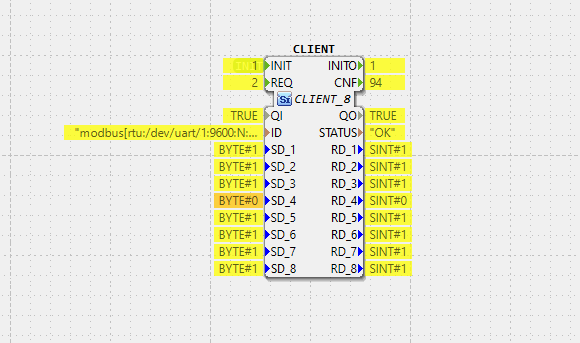modbus[(protocol:)ip:port:(slaveId):pollFrequency:readAddresses:sendAddresses(:responseTimeout:byteTimeout)]
Modbus
Installation Instructions
The Modbus com interface need the libmodbus library to work. Follow the steps below to set up your environment before compiling 4diac FORTE.
-
libmodbus files should be placed in the following folder structure:
-
[libmodbushome]/include/modbus: include files -
[libmodbushome]/lib:libmodbus.lib(windows) orlibmodbus.so(posix)
-
-
When configuring 4diac FORTE project with CMake choose
[libmodbushome]asFORTE_COM_MODBUS_LIB_DIR -
forte.exemust be able to find the dynamic libmodbus library after build. Therefore copylibmodbus.dll/soto folder withforte.exeor addlibmodbus.dll/soto library include path.
Parameters
Modbus Client (TCP)
Usage of the Modbus Client (TCP):
-
protocol: tcp (tcp is default)
-
ip: address of Modbus server, e.g. 127.0.0.1
-
port: preferably above 1024, default is 502
-
slaveId (optional): the slave id used by the modbus server (0xFF is standard); this is in principle an optional parameter but some modbus devices (e.g. Siemens SENTRON PAC power measurement devices) need this parameter in order to establish a connection. Also if you use a Modbus-RTU to Modbus-TCP Gateway like for Example EX9133C-2-MTCP then this slaveID does tell which Device on the RTU Side you want to connect to.
-
pollFrequency: polling frequency in milliseconds
-
readAddresses: addresses can be specified between 0-65535 more than one address (max 100) can be specified using
-
comma for separate addresses 0,2,65500
-
dots for interval 5..10
-
combination 0,5..10,2,65500
-
function is by default holding register, and can be changed with a prefixed letter
-
'c' for coil
-
'd' for discrete input
-
'h' for holding register
-
'i' for input register
-
-→ see below for a Detailed Table
-
-
-
sendAddresses: addresses can be specified between 0-65535 if data is only read sendAddresses should be left empty more than one address (max 100) can be specified using
-
comma for separate addresses 0,2,65500
-
dots for interval 5..10
-
combination 0,5..10,2,65500
-
function can be selected like for readAddresses
-
-
responseTimeout (optional): timeout in milliseconds to wait for a response (500ms is default)
-
byteTimeout (optional): timeout in milliseconds between two consecutive bytes (500ms is default)
-
to reuse a previous connection define only ip and port and leave everything up to slaveId empty
Example:
modbus[tcp:127.0.0.1:502::20000:h0..3:]
Modbus Client (RTU)
Usage of the Modbus Client (RTU):
modbus[protocol:port:baudrate:parity:databits:stopbits:flow:(slaveId):pollFrequency:readAddresses:sendAddresses(:responseTimeout:byteTimeout)]
-
protocol: rtu
-
port: serial port, e.g., /dev/ttyS0 or COM1
-
baudrate: serial port baudrate, e.g., 9600
-
parity: N for none, E for even, O for odd
-
databits: number of data bits, e.g., 8
-
stopbits: number of stop bits, e.g., 1
-
flow:
-
leave empty for none
-
arduino - disable DTR and wait for Arduino to boot just in case
-
delay - wait 2 seconds after connecting
-
longdelay - wait 3 seconds after connecting
-
-
all other paramters are as for TCP
-
except the slaveId, while it is optional in some cases for Modbus-TCP, is is mandatory for Modbus-RTU, and in most cases the factory default of devices is 1
-
-
to reuse a previous connection define only port and leave everything up to slaveId empty
Example:
modbus[rtu:/dev/ttyUSB0:19200:N:8:1::1:2000:i6142,i6132,i6137:h64025..64028,h63995..63998]
Table of Functions:
| read | write | ||
|---|---|---|---|
c |
coil |
modbus_read_bits |
modbus_write_bits |
d |
discrete input |
modbus_read_input_bits |
|
h |
holding register |
modbus_read_registers |
modbus_write_registers |
i |
input register |
modbus_read_input_registers |
Example: Writing Outputs of a 8-Output Relay Card:
modbus[rtu:/dev/uart/1:9600:N:8:1::1:2000:c0..7:c0..7]

Where to go from here?
-
Go back to Protocols index:
Communication Index -
If you want to go back to the Start Here page, we leave you here a fast access
Start Here page
Or Go to top
